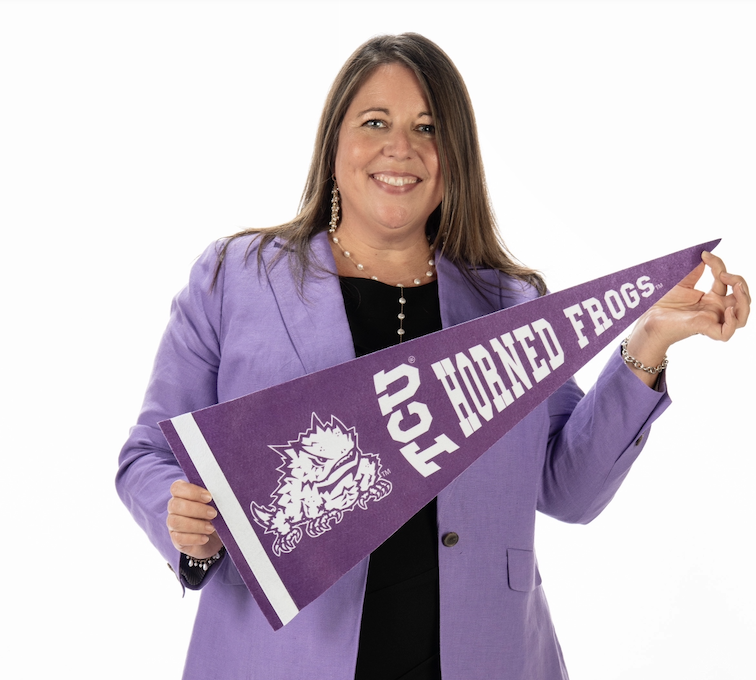Frog Finder
Dean of Admission Mandy Castro leads the team that serves prospective students.

TCU’s Mandy Castro champions a holistic admissions approach that sees beyond test scores to the stories behind every application. Photo by Glen E. Ellman
Frog Finder
Dean of Admission Mandy Castro leads the team that serves prospective students.
Mandy Castro, dean of admission, is proud of TCU’s holistic review of applications, which goes beyond test scores to forge an individual and empathetic understanding of each student through written and video submissions. Castro took the helm of TCU’s office of admission in 2024, following her seven-year tenure as director of admission. Today she leads a staff of 36, most of whom help in the effort to review more than 10,000 applications every year, selecting each incoming class of Horned Frogs.
You went to the University of Oklahoma; how did that experience and the degrees you earned lead you to a career in university admission?
When I was a student at Oklahoma, I took the opportunity to study abroad; I got degrees in psychology and Spanish. When I graduated, I moved abroad and lived in Spain for about four and a half years. I came back to the United States and started working in human resources; a job opened at the University of Oklahoma in the office of admissions — it was really interesting because it paralleled what I had been doing in human resources, which was recruiting.
I pursued a master’s degree in organizational dynamics with an emphasis in technical project management. I think the part of the psychology degree that I liked the most was data — getting to share all of the data inquiries, looking through the puzzle pieces and helping to move the needle drew me in and kept me interested in admission.
What is your favorite part of working in admission?
I find that working with young people is really life-giving — the students keep us young. And getting to be on the forefront of what is changing in the world and helping set future students, then future employees, up for their next step is a really cool space to occupy.
Admissions is fun. There are folks who are hardwired to carry students through four years of their lives; the admission office typically isn’t that place but we’re the connectors to those people who make student experiences at TCU so wonderful.
What is the biggest change you’ve seen at TCU since you arrived?
We hit the pandemic while I was here, so the reset, the faculty teaching online, the campus opening, us coming back in person and then evolving into the TCU of today has been really interesting and fun.
I love that we are at a school that gives us a voice. Our new Chancellor has a vision that is going to help us grow, and I think that while we grow and change and maintain the essence of TCU, we’re in a new space and that’s exciting. We have a growth plan that the board passed, so the expectation is to grow about 3 percent a year for the next 10 years.
What does a typical day look like for you during peak application season?
I’ll speak from the counselor perspective. My days can be filled with meetings and every day, we host about a hundred people on the tours, where the guides show them the campus and tell stories. Counselors meet them after they’ve seen the campus and answer any additional questions that they have. Applications are due Nov. 1, and we render decisions somewhere in early to mid-December. So the six weeks between Nov. 1 and when we get the application decisions out are intense. We process upward of 10,000 applications during that time. Most of our free time is spent with doors closed and reading applications that are upward of 12 to 13 pages each. Each student deserves to be able to tell their story and not just be a set of data points. They have experiences in life that they’ll bring with them, and we’re just trying to identify those who we think would thrive at TCU.
Why is it important for you to read applications alongside your staff?
I think that if you get into upper administration at any level, you can lose sight of who you’re actually serving. It’s important for us to keep our pulse on who the students are, what their changing needs are and how we can serve them as a community. For example, we needed more campus resources in the area of mental health — that came after the pandemic. We understand when we read applications everybody’s lived experiences and help partner them with the resources on campus.
How is the TCU selection process unique?
The holistic review is unique simply because you’re looking for the students who would thrive on your institution’s campus. If we can find a student whose ability matches our resources, we can help ensure their success. Our holistic review process also allows students to add a freedom of expression piece to their application. That can be a piece of writing, poetry, a visual depiction of something that’s interesting to them, etcetera. Some students have a part of their lived experience that has been ongoing all through high school that they’re not going to carry on in college, and they can show it to us through video or another platform. And that’s often exciting to see when we read an application.

Mandy Castro sees herself and her team as “brand ambassadors” for TCU’s colleges, majors and the city of Fort Worth. Photo by Glen E. Ellman
What stands out the most to you when reviewing a student’s application?
It depends on the student. If you’re looking for somebody who presents as an artist, you’re going to look for those components. If you’re looking for a student who’s going into business, is there a piece that aligns with business?
I’ll tell one little story. A student was a first-generation applicant whose essay was about his family celebrating his graduation from high school, and he’s going to be the first in his family to attend college. Then I opened his freedom of expression, which was a video clip, and it was a guy in workout attire, grunting through a deadlift, and he splices the video to him saying, “I’m so glad you watched that, because what I showed you was my one rep max of a deadlift. When I started high school, I was overweight and I started to work out with an older kid and he pushed me to continue with it.”
So, in a short 30-second clip, I was able to see something that did not surface in the application and that set this student apart. I saw somebody who had worked really hard for their academic achievement, who was being celebrated and supported by their family, and also somebody who had had a transformational experience in high school that would lend me to believe that they could transition to college and succeed.
Which qualities make for great Horned Frogs?
Our students are so diverse. I think that the students are academically astute; they’re ready for the challenge. They need to be able to hit the ground running and succeed in our rigorous curriculum. I think that intellectual inquiry just in the sense of, “I want to know more, I want to figure it out,” digging into the puzzle pieces and asking questions, aligns with who our students typically are. I think that when they look at the long term, TCU isn’t the destination; TCU is a stop that fortifies them on their path to what’s next.
With TCU’s admission process becoming more competitive, which challenges does your team face?
The hardest part of admission is saying no; we get into the business so we can admit students. We have some very popular programs that are nationally recognized, and students are very interested in these. We’re trying to differentiate between students with a similar academic profile and figuring out who we can take and who we can’t. That’s why we have readers and multiple layers of review and evaluation so that we can find the most well-rounded class of students for each of our degree programs.
What does being selective do for the university?
It really elevates your peer set. Being selective allows us to choose the students who we can best support and help thrive in the most appropriate ways — those who can come and do research on our campus, who can graduate with a degree with pride and give back to our institution and our communities. We’re really taking the whole mission, vision and values of TCU into consideration. And if we see ethical leaders and responsible citizens and potential world–changers, those are great, aligned students with us; when you can choose those students to be a part of your community, then they thrive here.
What do you think TCU’s most significant selling point is to potential students?
TCU is safe and we care. We commissioned a study right before the pandemic, and we discovered that TCU had some very distinct characteristics that students found in us. We are people who are ambitious; we are goal-oriented. But the undergirding of all of that was this deep level of care where students could try and fail and then try and succeed in a place that wasn’t going to write you off when you didn’t do it right the first time, but a place where you could iterate and become better.
“I find that working with young people is really life-giving — the students keep us young.”
Mandy Castro
What is something people might not know about your job?
There’s much more data that goes into it than you would imagine. We don’t simply meet with students and tell them how wonderful TCU is and then they enroll — we have to be brand ambassadors for every college, every major, the institution as a whole, the city of Fort Worth, the state of Texas and the United States in general. So when we find students for TCU, it’s a multifaceted process that involves lots of different layers. During the evaluation and consideration, a student’s application is read upward of five to seven times before a decision is rendered. A lot of times people think, “I’m just filling this fluff out so that I can turn it in and nobody’s actually going to lay eyes on it.” It’s exactly the opposite.
How do you stay inspired and motivated in your role?
The changing environment of college keeps us on our toes. We’re fortunate to work in a place that has an academic cycle. We do different things at different times of the year, which is exciting to me. During one period, I’m preparing people to get ready to hit the road; during another period, we’re traveling; next, we’re reading applications; then we’re hosting lots of families on campus for events and programs. And all of those things are engaging in their own ways, so that keeps you motivated for what’s to come. The puzzle-solver in me likes to take what could be improved upon and tweak it moving forward to see if we can do a little bit better each time.
Editor’s Note: The questions and answers have been edited for length and clarity.

Your comments are welcome
Comments
Related reading:
Alumni
All TCU Alumni Welcome
Explore facts and figures from the Alumni Association, which connects Horned Frogs across the globe.
Alumni
Erin Dianis: How It Started … How It’s Going
The Fulbright award winner has found inspiration in teaching overseas.
Features
Guided by Light
Charity Ketu embodies TCU’s connection culture with bold ideas and a big heart.